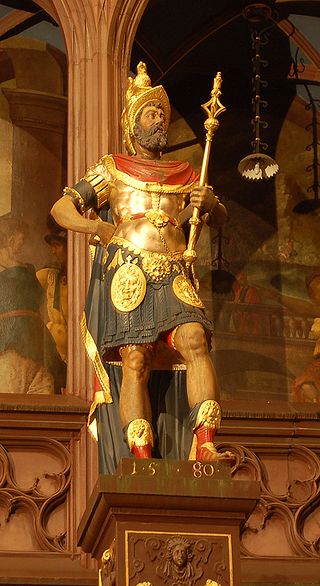Related Research Articles
This article concerns the period 79 BC – 70 BC.

The Realencyclopädie is a series of German encyclopedias on Greco-Roman topics and scholarship.
Gaius Verres was a Roman magistrate, notorious for his misgovernment of Sicily. His extortion of local farmers and plundering of temples led to his prosecution by Cicero, whose accusations were so devastating that his defence advocate could only recommend that Verres should leave the country. Cicero's prosecution speeches were later published as the Verrines.
Marcus Tullius Tiro was first a slave, then a freedman, of Cicero from whom he received his nomen and praenomen. He is frequently mentioned in Cicero's letters. After Cicero's death Tiro published his former master's collected works of letters and speeches. He also wrote a considerable number of books himself, and is thought to have invented an early form of shorthand.

Marcus Atilius Regulus was a Roman statesman and general who was a consul of the Roman Republic in 267 BC and 256 BC. Much of his career was spent fighting the Carthaginians during the first Punic War. In 256 BC, he and Lucius Manlius Vulso Longus defeated the Carthaginians at the naval battle off Cape Ecnomus; afterwards he led the Roman expedition to Africa but was defeated at the Bagradas River in spring of 255 BC. He was captured and then probably died of natural causes, with the story of his death later being much embellished.
Marcus Aemilius Scaurus was a Roman politician of the 1st century BC and son of Marcus Aemilius Scaurus and Caecilia Metella.
Gaius Cassius Longinus was a Roman consul in 73 BC.
Marcus Atilius Regulus was a Roman politician and statesman. He was consul in 227 and 217 BC and later censor in 214 BC. He was the son of his homonymous father who was consul in 267 and 256 BC.
Marcus Atilius Regulus was a Roman consul in 294 BC. During his year, according to Livy's main source, he served against the Samnites and Apulians without great success until he vowed a temple to Jupiter Stator. After a victory at Interamna, Livy reports that a triumph was refused; the Acta Triumphorum however report that Regulus triumphed over the Volsones and the Samnites.
Elimar Klebs was a German historian of ancient history. He was the brother of botanist Georg Klebs.
The gens Servilia was a patrician family at ancient Rome. The gens was celebrated during the early ages of the Republic, and the names of few gentes appear more frequently at this period in the consular Fasti. It continued to produce men of influence in the state down to the latest times of the Republic, and even in the imperial period. The first member of the gens who obtained the consulship was Publius Servilius Priscus Structus in 495 BC, and the last of the name who appears in the consular Fasti is Quintus Servilius Silanus, in AD 189, thus occupying a prominent position in the Roman state for nearly seven hundred years.
The gens Modia was a minor family at Ancient Rome, known from a small number of individuals.
Gaius Atilius Serranus was a Roman senator, who served as consul in 106 BC as the colleague of Quintus Servilius Caepio.

The gens Munatia was a plebeian family at Rome. Members of this gens are first mentioned during the second century BC, but they did not obtain any of the higher offices of the Roman state until imperial times.
Lucius Anicius Gallus was a Roman senator and military commander. He led the conquest of Illyria during the Third Macedonian War.
The gens Sornatia was an obscure plebeian family at ancient Rome. Few members of this gens appear in history, of whom the most famous was a general of Lucullus during the Third Mithridatic War, but several others are known from inscriptions.
The gens Staberia was a minor plebeian family at ancient Rome. Members of this gens are first mentioned in the final decades of the Republic, but they never achieved much importance. The most illustrious of the Staberii may have been the Grammarian Staberius Eros, though he was a freedman. One of this family served as a military tribune in the time of Vespasian, but none of the Staberii obtained any of the higher offices of the Roman state; the consul Marcus Pompeius Silvanus Staberius Flavianus belonged to the Pompeia gens, although he was probably descended from the Staberii through a female line.
The gens Tadia was a minor plebeian family at ancient Rome. Members of this gens are first mentioned in the time of Cicero, but few achieved any great distinction in the Roman state.
Quintus Aelius Tubero was a Roman jurist and historian.
Gnaeus Servilius Caepio was a Roman politician who was consul in 141 BC; his colleague was Quintus Pompeius. He was the elder brother of one of his immediate successors in the consulship, Quintus Servilius Caepio, and the homonymous son of the consul of 169 BC.
References
- ↑ Cicero, In Verrem 2.37 and 4.42
- ↑ Livy, Ab urbe condita librorum periochae 96.
- ↑ Scholiasta Gronovianus in Cicero, Divinatio in Q. Caecilium 3, p. 382 ed. Orelli.
- 1 2 Elimar Klebs: Arrius 7, in: Realencyclopädie der classischen Altertumswissenschaft , vol. II,1, c. 1252